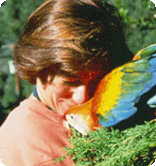Towelling a young Eclectus

Hi Phoebe, Due to toweling my new young male Eclectus to medicate him, he is now terrified of towels. Is there a way to get him past this fear? He is also bonded to his cage and doesn’t want to spend time with me away from his cage. I’ve taken him to other homes to socialize, but this didn’t help. He became bonded to his cage before the medical problem was addressed. He aspirated as a baby and came down with pneumonia and it seems that the stress of coming to a new home triggered symptoms that required medical attention. This cost me over $1300 in vet bills. I haven’t told the breeder because I don’t think she would believe me. In your opinion should the breeder be held responsible for the illness, and what can I do? Before the 6 weeks of medication the bird was never active and sat in one place until it was apparent to me that he was very sick when food from his crop poured out of his mouth. That day x-rays should very cloudy lungs. He was put on medication for 6 weeks. After a couple of attempts with toweling and medicating him I laced cornbread with his medication instead of further traumatizing him during the time we were supposed to be bonding. When I bought him I noticed that a few of his red feathers contained yellow on both sides of his body. I now believe this is an outward sign that he sustained trauma of aspirating as a baby. It must have been a small amount.
The doctor said it is very common. Having a standoffish bird is not what I had in mind and I don’t know what to do about it. Do you have any thoughts about all this? Thank you.

Hi Kathleen, I'm so sorry for your little guy. He's been through a lot for being young. Please tell us exactly how old he is and his name, OK?
Even though you have both been through a certain amount of trauma, the good point is that you probably have a solid relationship with an avian vet who can continue to help your parrot maintain good health. Perhaps a person at the vet hospital took a particular interest in him and can now become his babysitter and part of your local support network. All in all, robust health is the key to good relationship and increased activity and will contribute to his desire to explore more territory. Recovery from aspiration depends upon how much air sac tissue was affected so be sure to have him re-checked by your avian vet. The moment he seems down and inactive is the time to have him checked, not later.
Whether or not you confront the breeder with the past events depends on the relationship you have with that person. If you are confident that the result will yield desired results then sure, give a call. However, if you think there will be acrimony and that nothing will come of it, my advice is to concentrate on the here and now with your eclectus and stay in the moment.
Also, aspiration can happen at any time. It could have happened when he was a teeny baby, or in the carrier during transport to your home, or while he was at your house.
Parrots form bonds throughout their lives so its not like you've missed one critical bonding period that will never happen again. You did the right thing by getting him healthy when he was sick. When he's confirmed healthy and active once again, put food bowls at the front of the cage, put some half perches on the cage door and keep the door open as much as possible. Fix it so that he can eat both at the front of the cage or while perching on the open cage door. My eclectus love mega millet and will go for it wherever it hangs; try it to see if it entices him, too.
It's most important for you to discover what he finds reinforcing, what he does that comforts him, what behaviors he conducts to soothe himself and then acknowledge these. Try to set up the physical and emotional environments to encourage more of these behaviors. Watch him and catch him doing something cute like puffing his feathers, scratching his head with his foot, turning around on his perch, or cocking his head and give those behaviors verbal reinforcement. Key in to what he's doing by giving him your undivided attention and praise when you see him moving to soothe himself and/or moving towards you. Also, establish a contact whistle or call that you use when you enter the house, his room, his area and use this consistently.
Please check out the following articles which will really help you:
http://www.parrots.org/pdfs/all_about_parrots/reference_library/behaviour_and_environmental_enrichment/Shaping%20New%20Behaviors.pdf
http://www.parrots.org/pdfs/all_about_parrots/reference_library/behaviour_and_environmental_enrichment/Success%20Files.pdf
Remember, we are trying to increase his physical skills and we do this by creating environments where it's easy for him to do physical behaviors. We want him to gain physical acuity and increase the numbers of observable behaviors he conducts. When he walks or climbs from perch to perch, touches toys, destroys a stalk of mega millet, scratches his head with one foot, then with the other, turns around and fans his tail, rings a bell or whistles when you enter the room, you and he will have fully bonded.
Also, seriously consider purchasing Barbara Heidenreich's books because they will help you establish an excellent and active relationship with your parrot. Therein, you'll learn about desensitizing him to towels through the creation of non-threatening learning situations.
Keep us posted, Kathleen.
All best,
Phoebe

































